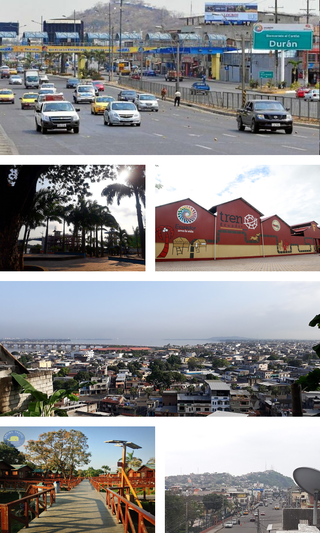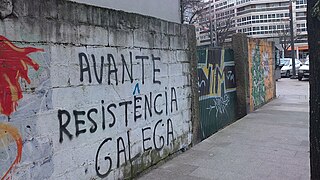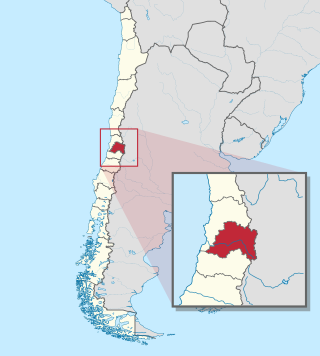Terrorism in Ecuador is a rare occurrence as the country, despite recurrent periods of economic and political instability, has
been traditionally known as a peaceful state in Latin America, unlike its neighbor states; Peru and Colombia, which have suffered widespread violence by insurgent, paramilitary and drug trafficking organizations (all using terror tactics) in different degrees for more than fifty years. [1] [2]
| Part of a series on |
| Terrorism |
|---|
Attacks in Ecuador have traditionally been carried out by small domestic organizations (both known and anonymous) as well as, in a lesser degree, foreign Colombian groups operating within Ecuador's borders. A number of terror organizations have been inactive for several years.
Domestic terrorist groups present in Ecuador, although some have been operationally inactive in the last few years, include the Popular Combatants Group (GCP), the Revolutionary Militia of the People (MRP), the Marxist-Leninist Party of Ecuador, and the ¡Alfaro Vive, Carajo!. [3] AVC was notably active in the 1980s, while both the GCP and MRP variously claimed authorship for a series of attacks in the late 1990s and early 2000s.
Foreign groups include the Colombian groups Revolutionary Armed Forces of Colombia (FARC) and National Liberation Army (ELN). [3]

The 2004 Madrid train bombings were a series of coordinated, nearly simultaneous bombings against the Cercanías commuter train system of Madrid, Spain, on the morning of 11 March 2004—three days before Spain's general elections. The explosions killed 193 people and injured around 2,050. The bombings constituted the deadliest terrorist attack carried out in the history of Spain and the deadliest in Europe since 1988. The attacks were carried out by individuals who opposed Spanish involvement in the 2003 US-led invasion of Iraq.

Durán, also known as Eloy Alfaro, is the second largest city in the province of Guayas, Ecuador and the seat of Durán Canton. It is located near the confluence of the Daule & Babahoyo rivers, where the Guayas River enters the ocean, across the Guayas River from Guayaquil. The name "Eloy Alfaro" was chosen because of the Ecuadorian ex-president Eloy Alfaro Delgado. According to the National census in 2022, the city had a population of 295,211. Many of its inhabitants commute to other places for work and it can be considered a "dormitory town". However, many people who live in Durán find work within the canton by opening "comedores" or small restaurants, selling produce at the market, or even opening little stores with basic produce and house necessities. The towns Durán, Samborondón, and Guayaquil are connected by the bridge Rafael Mendoza Avilés.

¡Alfaro Vive, Carajo! (AVC), another name for the Fuerzas Armadas Populares Eloy Alfaro, was a clandestine left-wing group in Ecuador, founded in 1982 and named after popular government leader and general Eloy Alfaro. The group was labeled as a terrorist organization by the Ecuadorian state during the period of the former president León Febres Cordero. It existed between 1983 and 1991, when it carried out various armed actions and criminal acts in Ecuador, with Colombian (M-19) and Nicaraguan influence. The group was initially formed sometime in the 1970s, but was not active militarily for the first few years of the 80's.
The proxy bomb, also known as a human bomb, is a tactic that was used mainly by the Provisional Irish Republican Army (IRA) in Northern Ireland during the conflict known as "the Troubles". It involved forcing people to drive car bombs to British military targets after placing them or their families under some kind of threat The tactic was later adopted by the FARC in Colombia and by rebels in the Syrian Civil War.

The 2003 El Nogal Club bombing was a terrorist attack that occurred in Bogotá, Colombia. On 7 February 2003, a car containing 200 kg of explosives that was parked in a garage on the third floor of the multi-story El Nogal club, an elite, high-class social and business club, exploded, killing 36 people and wounding more than 200. There were approximately 600 people in the building at the time of the explosion. The attack was the worst in Colombia for more than a decade.

The Ferrocarriles del Ecuador Empresa Pública is the national railway of Ecuador. The railway system was devised to connect the Pacific coast with the Andean highlands. After many decades of service the railway was severely damaged by heavy rainfall during the El Niño in 1997 and 1998 and from general neglect as the Pan-American Highway siphoned off passengers.
The 2009 Palma Nova bombing occurred on July 30, 2009, when a limpet bomb went off outside a Civil Guard barracks in the town of Palma Nova, Majorca, Spain. The bomb was placed under a patrol car and two Civil Guard officers died as a result of the explosion. A second device was found under another Civil Guard vehicle at nearby barracks and safely exploded by police. On August 9, the Basque nationalist and separatist organisation ETA claimed responsibility for the attack, while four other bombs exploded around restaurants and shopping centres in Palma, Majorca, causing no injuries.

Resistência Galega, sometimes referred to as REGA, is the term used by a series of left-wing and Galician separatist organisations and individuals to claim attacks in Galicia. The term was first used in 2005 when a manifesto named Manifesto da Resistência Galega appeared on the Internet. Since then, Resistência Galega has carried out dozens of attacks against political party offices and banks across Galicia.

On 8 September 2014, a fire extinguisher bomb exploded in the Escuela Militar metro station in Santiago, Chile, injuring 14 people, several seriously. Though no group or individual has claimed responsibility, the attacks have been attributed to the Chilean Anarchist group, Conspiracy of Cells of Fire.
The Group of Popular Combatants is a far-left Marxist–Leninist insurgent movement active in the Republic of Ecuador. It is the armed wing of the Marxist–Leninist Communist Party of Ecuador, a party formed in 1964 as a split from the Communist Party of Ecuador and internationally affiliated with the International Conference of Marxist–Leninist Parties and Organizations. The party belongs to an anti-revisionist tradition of Marxism–Leninism, one originally aligned with Albania during the Cold War and frequently referred to as Hoxhaism.
Terrorism in Argentina has occurred since at least the 1970s, especially during the Argentinian Dirty War, where a number of terror acts occurred, with support of both the democratic government of Juan Perón, Isabel Perón and the following de facto government of the National Reorganization Process. In the 1990s, two major terrorist attacks occurred in Buenos Aires, which together caused 115 deaths and left at least 555 injured.
On 17 January 2019, a vehicle was driven into the General Santander National Police Academy in Bogotá, Colombia. The truck forced its way into the facility, hit a wall and detonated, killing 22 people and injuring 68 others. Suicide attacks are unusual in Colombia. The car contained about 80 kilograms (180 lb) of pentolite. It was the deadliest attack on the Colombian capital since the 2003 El Nogal Club bombing and the first terrorist attack on the capital since the 2017 Centro Andino bombing. The National Liberation Army (ELN) accepted responsibility for the attack and justified it as a response to the bombings made by the Colombian government during the unilateral ceasefire.

The Práxedis G. Guerrero Autonomous Cells of Immediate Revolution was an urban guerrilla group that centered its attacks in the metropolitan area of the Valley of Mexico, extending some attacks to neighboring states. This group, along with a dozen other cells, came to be considered a serious threat to the stability of the Mexican capital according to publications made by CISEN.

The Antagonic Nuclei of the New Urban Guerrilla is a Chilean armed group created in mid-2011, active in the Santiago Metropolitan Region attached to insurrectionary anarchist theories, being responsible for several attacks in recent years.
The Vandalika Teodoro Suárez Gang was an Argentine urban guerrilla group active in the metropolitan area of Buenos Aires, from 2010 to 2011, where it launched attacks on banks and offices belonging to private companies.
The Iconoclastic Caravans for Free Will were an anarchist cell active in the Santiago Metropolitan Region, being known for some attacks in the communes of Las Condes and Vitacura. The group gained attention from the authorities for its members being closely investigated during the investigation of the Bombas Case.
The Leon Czolgosz Autonomous and Destructive Forces, were a Chilean anarchist cell formed in September 2006, known for its attacks against the National Intelligence Agency of Chile and the British embassy in Chile. The name of the group was in honor of the American anarchist Leon Czolgosz, who on September 6, 1901 assassinated then-United States President William McKinley with two bullets at point-blank range.

Since around 2018, Ecuador has suffered a security crisis resulting from conflicts between criminal organizations with connections to drug trafficking. In recent years, coca leaf production has risen in neighboring Colombia and Peru, with both cocaine and coca base entering Ecuador by land and leaving by sea. The border with Colombia became more porous after Rafael Correa in 2009 declined to renew the US military's lease at Eloy Alfaro Military Base in Manta and stopped working with the United States' Bureau of International Narcotics and Law Enforcement Affairs. Following Correa was Lenín Moreno, who cut funding for the prison system and the National Police of Ecuador.
The Ecuadorian USB bomb attacks occurred in March 2023 when boobytrapped USB drives were sent to Ecuadorian media. One journalist was injured.